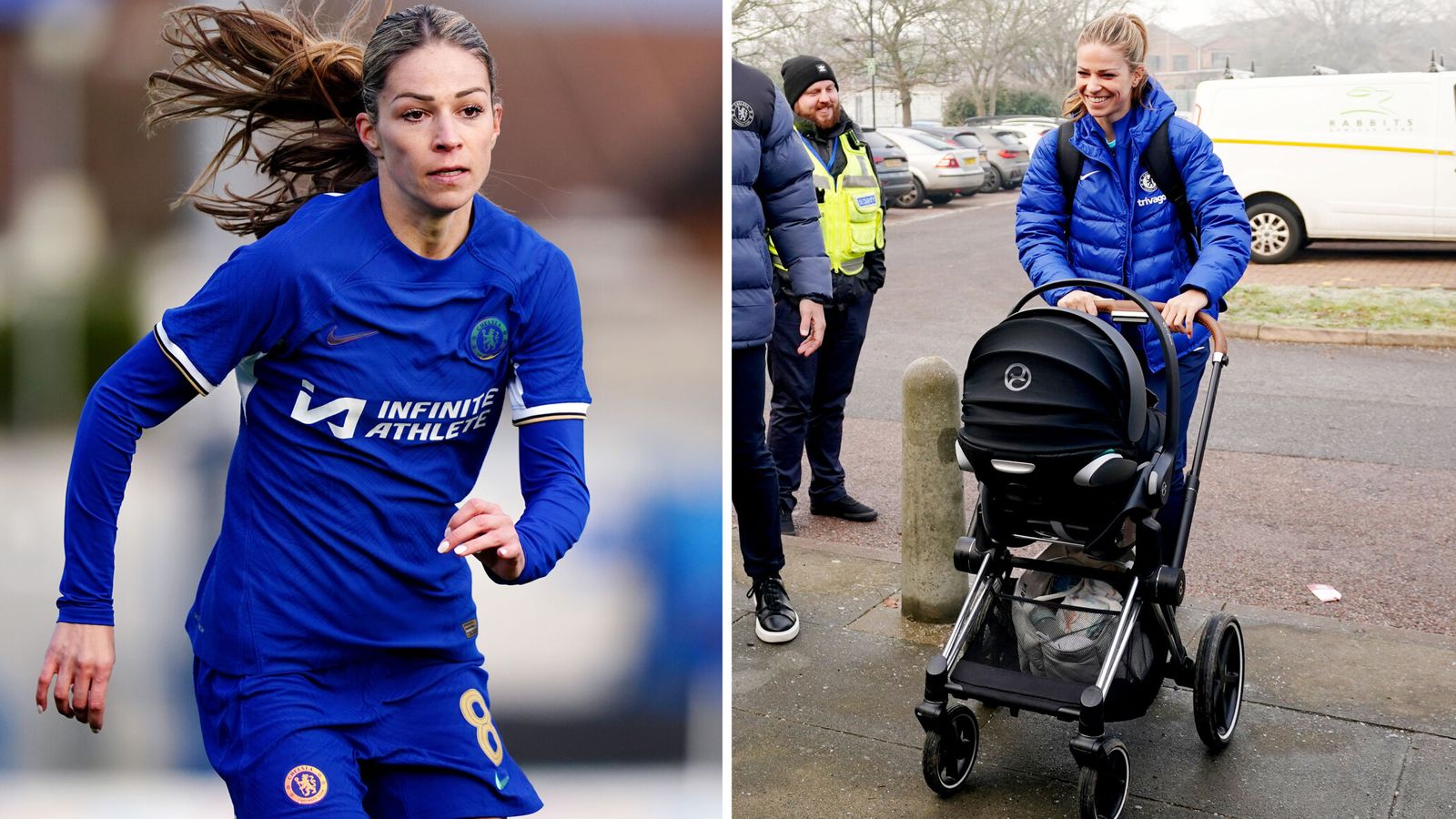Chelsea player Melanie Leupolz is a one-off in her team and a rarity in women’s professional sport. She’s a mum.
A mum who came back to her sport at an elite level after giving birth.
But the 29-year-old German international and Olympic gold medallist had to answer plenty of questions about her decision to take time out and start a family.
“At the beginning, I got some comments like how can you start a family at your prime time of being a footballer, why did you not wait until you retired?
“I didn’t listen, I knew what I wanted – a child and playing football as well – and everything was possible.”
And it was possible because Chelsea has a progressive attitude towards women’s health, helped no doubt by having a female coach in Emma Hayes, herself a mother, who also worked in women’s football in the US, where maternity leave among players is much more common.
“I told Emma straightaway for my safety and for the baby’s safety. So I was training with the team for four months but without any contact.
Russia-Ukraine latest: Vladimir Putin blamed for death of Alexei Navalny – as mourners arrested
Biden ‘contemplating’ steps to punish Moscow as world leaders blame ‘monster’ Putin for Navalny’s death
Alexei Navalny: Putin critic dies after ‘losing consciousness’ at maximum security prison
“They were careful about my heart rate and that I didn’t get the ball into my bump, but I was happy I could come to the training ground and see my teammates and be involved, and they didn’t know at that point.”
But she still had to take the best part of a year out from competitive football. Enough time to possibly lose your place, or to lose the focus you once had because of a change in priorities.
Leupolz says she doesn’t think it’s changed her hunger for the game but she admits she is different.
“You change a bit as a person because there’s a big other part of your life. Maybe you see football through different eyes and maybe that helps with the pressure and focus.
“But I still want to win everything! Two months after giving birth I was back with the team and travelling to winter camp. I was fully back in the squad and playing football, it’s amazing how quickly everything went.”
Read more from Sky News:
Ping pong fight lost football coach his job
Williams posts post-partum bikini picture
Be the first to get Breaking News
Install the Sky News app for free
She was lucky enough to be given a new contract before she left to have her son. So the financial worry was taken away.
Many women still putting off children until end of career
For many athletes in other sports, the financial burden of having a child, travelling the world for tournaments, and taking childcare with you is beyond the finances of all but the top female players.
It’s not surprising that many female athletes put off starting a family until after they’ve retired. Sport is an already short career, and so are the financial rewards.
The most decorated track athlete of all time with 10 Olympic medals, American sprinter Allyson Felix, famously found herself significantly financially worse off when she became pregnant in 2018.
Her sponsor Nike reduced her payments by 70%. She ended up dropping them.
She said: “Getting pregnant was known as the kiss of death for Olympic track and field athletes.”
The brand did not treat Serena Williams the same way when she announced her pregnancy after winning the Australian Open in 2017, but perhaps as (arguably) the greatest female player of all time, she had more marketing clout.
Williams also changed the Women’s Tour’s (WTA) maternity rules after speaking out about the lack of protection for female players and pregnancy.
Having been World Number One, Williams returned a year later with a daughter but ranked down at a lowly 451.
Women in tennis allowed to keep rank during maternity leave
Now players can protect their ranking for their first eight tournaments after having a baby, so they are not starting from scratch, drawing the new World Number One in the first round, with their previous good work still recognised.
But the main challenge for all but the top players in the world is the cost.
Players further down the rankings just don’t earn enough in winnings to support travelling week to week with a nanny.
That would mean paying for extra flights and an extra hotel room. The maths just doesn’t work.
British doubles player and Sky commentator Naomi Broady has struggled to go back to the sport she loves.
“It’s pretty impossible, I’d be totally reliant on what I’m earning on court, and then if a parent or my partner can’t travel with me it’s the cost of a nanny as well, so unless you’re earning serious top dollar then it’s just not achievable.”
Certainly becoming a mother seems less of a challenge if you are part of a team and have the backing of your club.
Leupolz admits she has had to make sacrifices and has had to think and plan a few steps ahead to make it work, like any other working mother in any other walk of life.
Attitudes to athletes starting families while still playing their sport are slowly changing.
But even she won’t be adding to her family until after she hangs up her boots.









